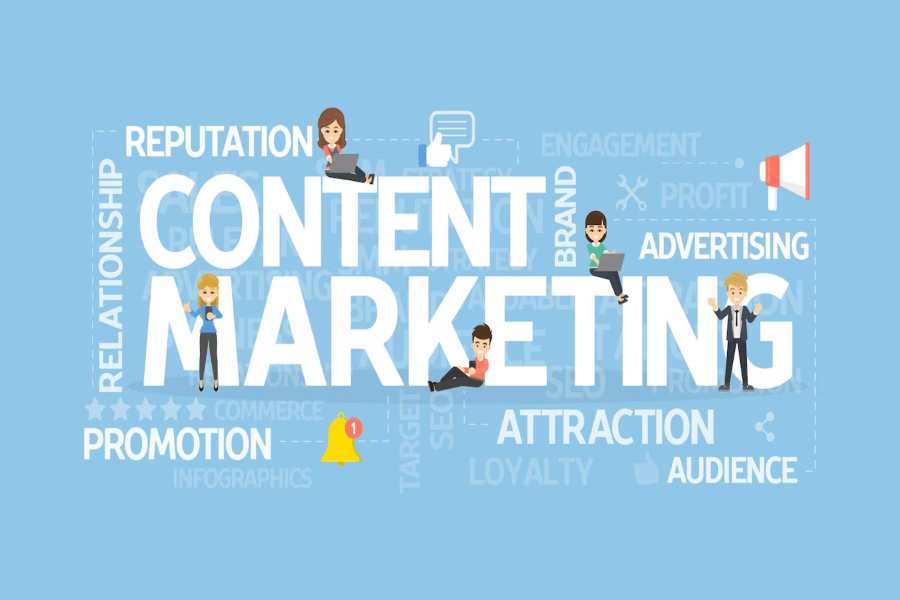
In today’s digital landscape, businesses strive to create meaningful engagement with their audience. A common question arises: Is content marketing part of digital marketing? The short answer is yes! Content marketing is a critical component of digital marketing that helps brands connect, educate, and convert customers. This guide explores how content marketing fits into digital marketing, why it matters, and how businesses can leverage it for success.
Is Content Marketing Part of Digital Marketing?
Yes, content marketing is part of digital marketing and plays a fundamental role in engaging and attracting customers online. It involves creating, publishing, and distributing valuable content to target audiences through various digital channels, such as websites, blogs, social media, and email marketing. Content marketing supports SEO, builds brand authority, and nurtures customer relationships, making it an essential digital marketing strategy.
The Role of Content Marketing in Digital Marketing
Content marketing is at the heart of digital marketing. It enables businesses to establish credibility, boost SEO rankings, and generate organic traffic. Unlike traditional advertising, which directly promotes products, content marketing focuses on delivering informative and engaging material that aligns with the audience’s interests.
Effective content marketing integrates various forms, including blog posts, infographics, videos, and e-books. By addressing the needs and pain points of customers, businesses can create a loyal following and drive conversions.
Furthermore, content marketing enhances user engagement. Social media platforms, for instance, thrive on valuable and shareable content. Whether through Instagram reels, LinkedIn articles, or YouTube videos, businesses can build stronger connections with their audience and improve brand awareness.
Content marketing also improves lead generation. By offering insightful content, businesses can capture potential customers’ interest and guide them through the buyer’s journey. From blog posts to gated content like whitepapers and webinars, brands can nurture leads and encourage them to make informed purchasing decisions.
How Content Marketing Aligns with Digital Marketing
Content Marketing and SEO
Search engine optimization (SEO) relies heavily on high-quality content to drive organic traffic and improve search rankings. Well-structured blog posts enriched with relevant keywords, authoritative articles, and engaging multimedia elements enhance a website’s visibility on search engines. By producing valuable content that addresses user queries, businesses can increase their domain authority and earn higher positions in search results. A strong SEO strategy, combined with compelling content, ensures long-term success in digital marketing.
Content Marketing and Social Media
Social media platforms thrive on engaging and shareable content. Brands leverage social media marketing to distribute blog posts, infographics, videos, and other forms of digital content that capture audience interest. Effective content marketing fosters community engagement, encourages shares and comments, and increases brand awareness. Platforms like Facebook, Twitter, Instagram, and LinkedIn provide opportunities for businesses to establish direct relationships with their audience. By maintaining a consistent content strategy, brands can build credibility and expand their digital presence.
Content Marketing and Email Campaigns
Email marketing remains a powerful digital marketing tool, but its success depends on well-crafted content. Personalized newsletters, exclusive reports, and targeted email campaigns help strengthen customer retention and engagement. Informative and valuable content within emails encourages recipients to open, read, and take action. Businesses that create compelling subject lines, incorporate storytelling elements, and offer relevant insights see higher open rates and conversions. Integrating content marketing with email strategies enhances customer relationships and drives long-term loyalty.
Content Marketing and Paid Advertising
Although content marketing primarily focuses on organic reach, it plays a vital role in complementing paid advertising strategies. Sponsored blog posts, pay-per-click (PPC) campaigns, and content-driven ads enhance visibility and attract potential customers. High-quality content used in advertisements increases click-through rates and encourages audience interaction. When businesses combine organic content marketing with paid promotions, they create a well-rounded digital marketing approach that maximizes brand exposure and customer engagement. By aligning content marketing with advertising efforts, brands can achieve better results and higher returns on investment.
Benefits of Content Marketing in Digital Marketing
- Increases Brand Authority: High-quality, well-researched content helps establish a business as a trusted leader in its industry. By consistently delivering valuable insights, businesses can build credibility and position themselves as go-to sources for information. Thought leadership through blog posts, whitepapers, and case studies reinforces authority and sets brands apart from competitors.
- Improves Organic Traffic: SEO-optimized content plays a crucial role in attracting potential customers. By incorporating targeted keywords, creating engaging meta descriptions, and structuring content for readability, businesses can improve their search engine rankings. Higher visibility in search results leads to increased organic traffic, providing a steady stream of visitors who are actively searching for relevant information.
- Builds Trust with the Audience: Informative and well-structured content fosters trust and credibility among users. Consumers are more likely to engage with brands that provide valuable insights without overly promotional messaging. By addressing customer pain points and offering solutions, businesses can develop long-term relationships with their audience, ensuring loyalty and repeat engagement.
- Enhances Customer Engagement: Interactive and engaging content encourages users to participate, comment, and share. Content such as quizzes, polls, videos, and infographics increases audience interaction and creates a sense of community. When businesses consistently produce compelling content that resonates with their target audience, they see higher engagement rates across digital platforms.
- Generates Leads and Sales: Well-structured content plays a significant role in guiding users through the buying journey. From awareness to decision-making, content marketing nurtures leads by providing them with the information they need to make informed choices. Landing pages, product descriptions, email campaigns, and informative blog posts all contribute to driving conversions and increasing revenue.
Why Content Marketing is Crucial for Digital Success
Content marketing is a fundamental component of digital marketing that drives sustainable business growth. Unlike short-term advertising campaigns, which provide immediate but fleeting results, content marketing focuses on long-term value. By consistently producing high-quality, relevant content, businesses can attract more visitors to their websites, generate leads, and retain customers over time. Well-crafted content educates and informs audiences, positioning a brand as an industry leader and fostering trust among potential customers.
One of the key reasons content marketing is indispensable is its adaptability to changing consumer behaviors. In today’s digital age, customers prefer to research products and services before making a purchase. They rely on blogs, reviews, videos, and other forms of content to guide their decisions. By providing valuable and insightful content, businesses ensure that they remain relevant and influential in their industry. Effective content marketing helps brands engage with their audience at different stages of the buyer’s journey, offering solutions and information tailored to their needs.
Another significant advantage of content marketing is its cost-effectiveness compared to traditional advertising. While paid advertising requires ongoing investment to maintain visibility, content marketing delivers continuous value long after the content has been published. A well-written blog post, for example, can attract traffic and generate leads for months or even years. The return on investment (ROI) for content marketing is often higher because it builds a strong foundation for organic growth without the need for constant spending on paid campaigns.
Furthermore, content marketing enhances brand credibility and trust. When businesses provide high-quality, informative content, they establish themselves as thought leaders in their field. Customers are more likely to engage with brands that offer helpful insights rather than direct promotional messages. This approach fosters long-term relationships and encourages repeat interactions, ultimately leading to increased customer loyalty and sales.
How to Implement Content Marketing in Your Digital Strategy
- Develop a Content Strategy: Creating a well-defined content marketing strategy is the first step toward success. Businesses must outline their goals, identify their target audience, and determine the types of content that will resonate with them. A strong strategy includes a content calendar, key performance indicators (KPIs), and a plan for content distribution. By setting clear objectives, companies can ensure that their content efforts align with their overall digital marketing goals.
- Create High-Quality Content: Producing engaging, informative, and valuable content is essential for attracting and retaining an audience. Content should be tailored to address customer pain points, answer questions, and provide solutions. Whether through blog posts, videos, infographics, or podcasts, high-quality content builds brand authority and encourages customer trust. Businesses should focus on storytelling, originality, and relevance to maximize the impact of their content.
- Leverage SEO Best Practices: Search engine optimization (SEO) is crucial in ensuring content reaches the right audience. Businesses should conduct thorough keyword research to target relevant search queries. Optimizing meta descriptions, using proper heading structures, and enhancing content readability can improve rankings on search engines. Additionally, incorporating internal and external links, image alt texts, and mobile-friendly formats further strengthens a content marketing strategy.
- Utilize Multiple Distribution Channels: Creating great content is only half the battle; distribution is key to reaching a broader audience. Businesses should promote content through various channels, including blogs, social media platforms, email newsletters, and video-sharing sites. Leveraging different mediums allows companies to engage with their audience on preferred platforms and maximize visibility. A multi-channel approach also ensures that content reaches both new and existing customers effectively.
- Measure and Optimize Performance: Analyzing content performance is essential to refining strategies and improving engagement. Businesses should use analytics tools to track key metrics such as website traffic, conversion rates, and user interactions. By evaluating performance data, marketers can identify which content resonates most with their audience and adjust their approach accordingly. Continuous optimization ensures that content marketing efforts remain effective and drive long-term success.
Conclusion
To answer the question “Is content marketing part of digital marketing?”—yes, it is an indispensable component. Content marketing fuels SEO, social media, email campaigns, and paid advertising, creating a cohesive digital marketing strategy. Businesses that embrace content marketing gain a competitive edge, boost brand authority, and build lasting customer relationships. Whether through blogs, videos, or social media posts, content marketing remains a powerful tool for online success.
FAQ’s
Q. What is the difference between content marketing and digital marketing?
A. Content marketing is a subset of digital marketing that focuses on creating and distributing valuable content. Digital marketing includes SEO, PPC, email marketing, and more.
Q. How does content marketing help SEO?
A. Content marketing helps SEO by incorporating relevant keywords, improving website authority, and increasing organic traffic through informative and engaging content.
Q. Can content marketing work without SEO?
A. While content marketing can exist without SEO, optimizing content for search engines maximizes visibility and effectiveness.
Q. What types of content are best for digital marketing?
A. Blogs, videos, infographics, case studies, and social media posts are highly effective content types for digital marketing.
Q. How often should businesses create new content?
A. Consistency is key. Businesses should create and distribute new content regularly—weekly or biweekly—to maintain audience engagement and improve SEO rankings.
Jessica Jones
Jessica Jones is a talented writer at J Morgan Marketing, where she excels in creating compelling and engaging content tailored to meet the unique needs of clients. With a keen understanding of digital marketing strategies, Jessica crafts narratives that not only captivate audiences but also drive brand growth. Her expertise spans across various content forms, from blog posts and articles to social media and SEO-driven copy, ensuring that every piece resonates with its intended audience and contributes to the overall marketing goals. Passionate about storytelling and innovation, Jessica is dedicated to helping brands connect with their audience through powerful and effective content.






